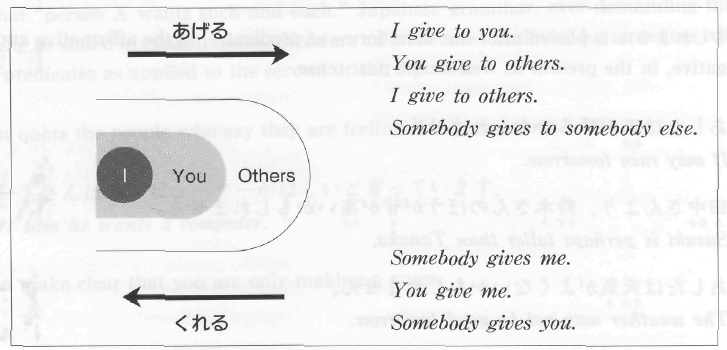|
||
| Grammar II - 14.03 | II - 16.01 ~te kureru / ageru / morau | ||
|
あげる/くれる/もらう - ageru / kureru / morau |
||
|
Japanese has two verbs for giving. When a thing moves away from the center, the transaction is described in terms of the verb あげる - ageru ("raise up"). When a thing moves toward the center, the verb we use is くれる - kureru ("to come"). |
| あげる - ageru -> | I give to you, you give to others, I give to others, somebody gives to somebody else |
|
くれる - kureru -> |
Somebody gives me, you give me, somebody gives you |
| With both あげる and くれる, the giver is the subject of the sentence, and is accompanied by the particle は or が. | |
| The recipient is accompanied by the particle に. | |
| 私はその女の人に花をあげます。 |
I will give the woman flowers. |
|
watashi-wa sono onnanohito-ni hana-o agemasu. |
|
| その女の人は男の人に時計をあげました。 | The woman gave the man a watch. *2 |
| sono onnanohito-wa otokonohito-ni tokei-o agemashita. | |
|
*2 When a transaction takes place between two
people other than yourself, as in this example, the verb to
use is normally ageru. |
|
| 両親が私に新しい車をくれる かもしれません。 |
My parents may give me a new car |
|
ryooshin-ga watashi-ni atarashii kuruma-o
kureru |
|
| (Giver) は/が (Recipient) に
あげる (Giver) は/が (Recipient) に くれる |
- (giver) gives to (recipient) |
| Transactions which are described with the
verb kureru can also be described in terms of
"receiving" or morau. With morau, it is the recipient that is the subject of the sentence, with ha [wa] or ga, and the giver is accompanied by the particle ni or kara. |
|
| 私は 姉に・姉から 古い辞書をもらいました。 | I received an old dictionary from my big sister. |
|
watashi-wa, ane-ni / ane-kara, furui jisho-o moraimashita. |
|
| (Recipient) は/が (Giver) に もらう
(Recipient) は/が (Giver) から もらう |
- (recipient) receives from (giver) *3 |
| (あなたは)私から手紙をもらいましたか。 |
*3 morau is like kureru and
implies that you identify yourself more closely with the
recipient than with the giver. |
|
(anata-wa,) watashi-kara, tegami-o moraimashita-ka? |
Did you receive a letter from me? |
|
Compare: |
|
| 姉が私に古い辞書をくれました。 | My big sister gave me an old dictionary. |
| ane-ga, watashi-ni, furui jisho-o kuremashita. | |
|
大統領が妹に手紙をくれました。 |
The President gave my little sister a letter. |
| daitooryoo-ga imooto-ni tegami-o kuremashita. | |
| 妹は大統領に手紙をもらいました。 |
You can use morau for third-party transactions if you can assume the perspective of the recipient. |
|
imooto-wa daitooryoo-ni tegami-o morai-mashita. |
My little sister received a letter from the President. |

